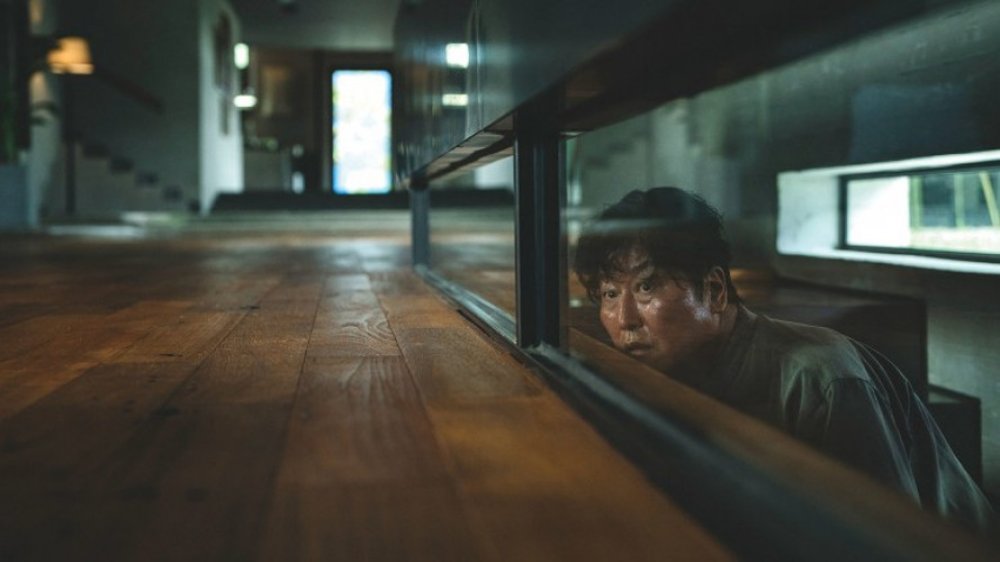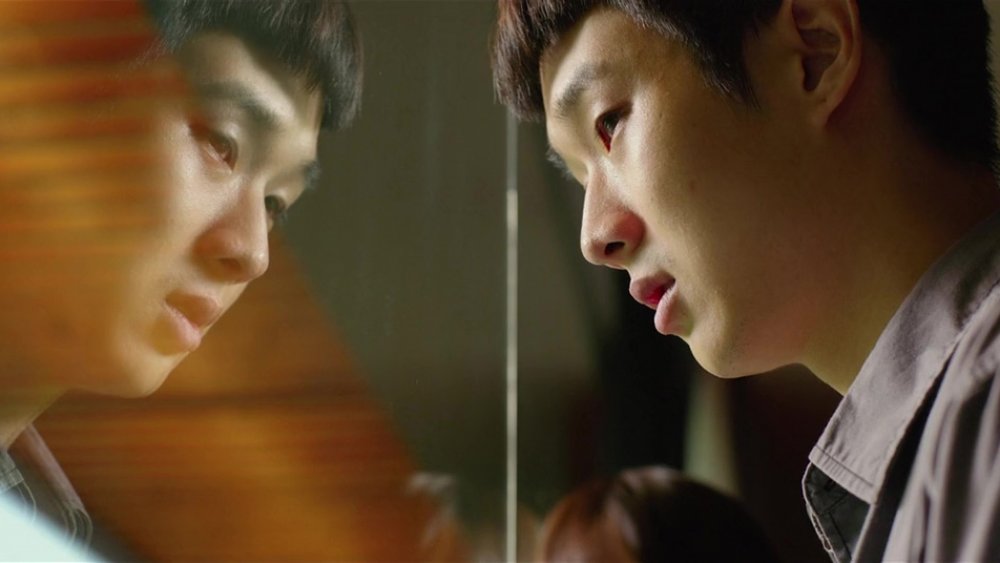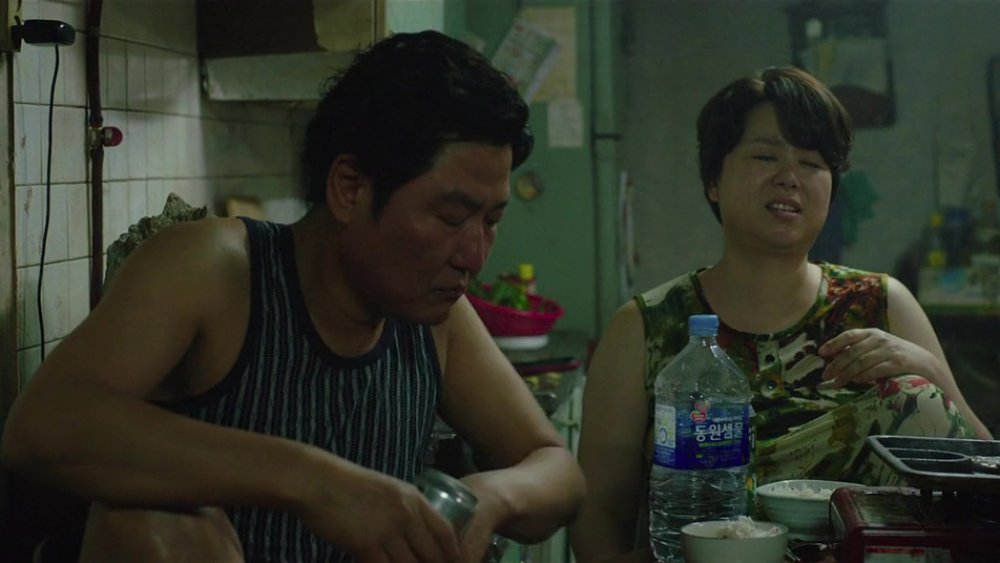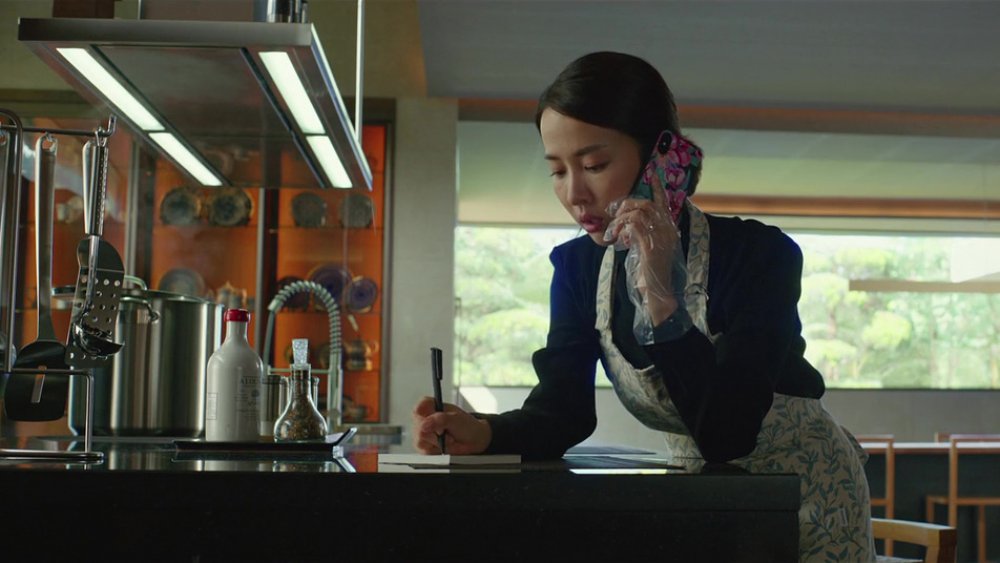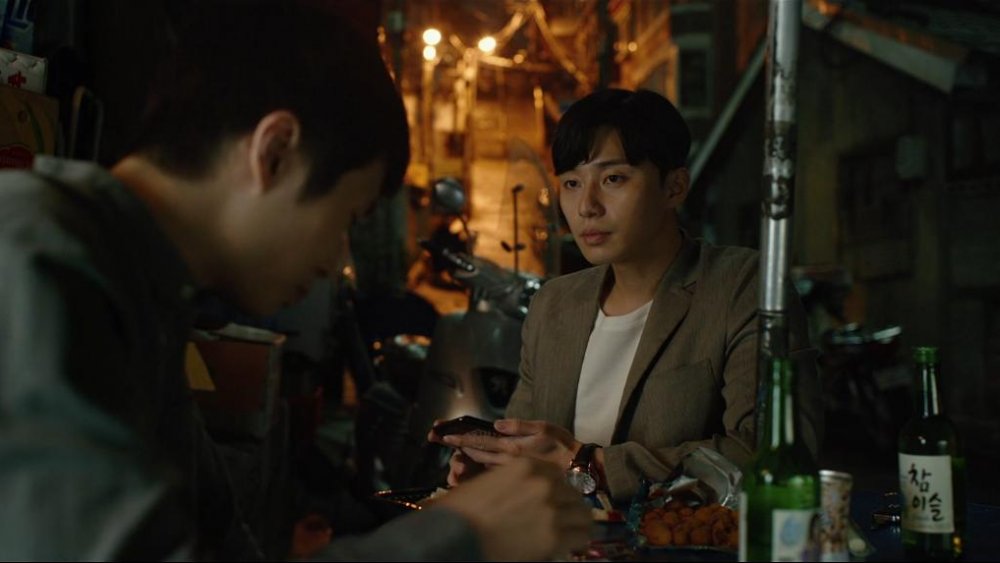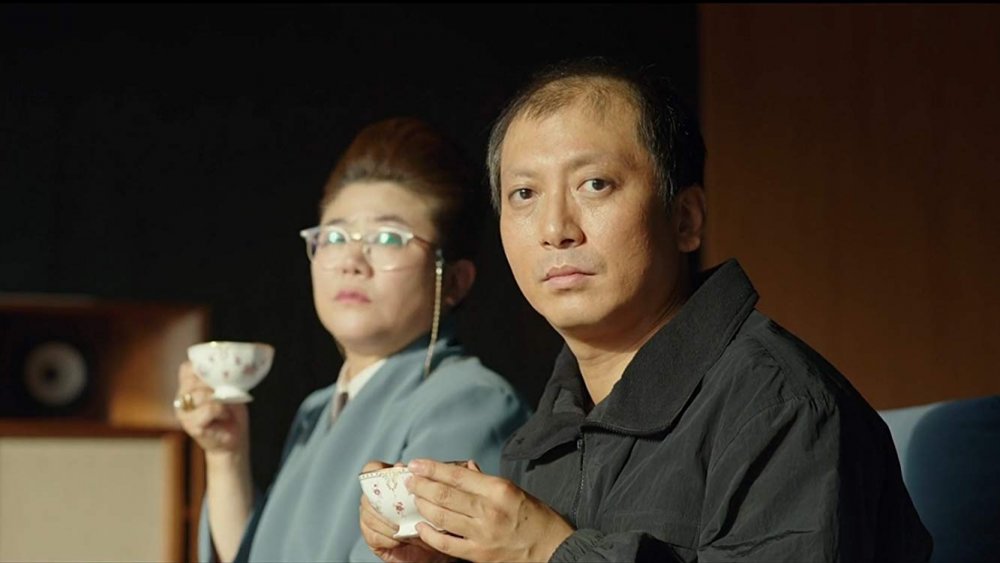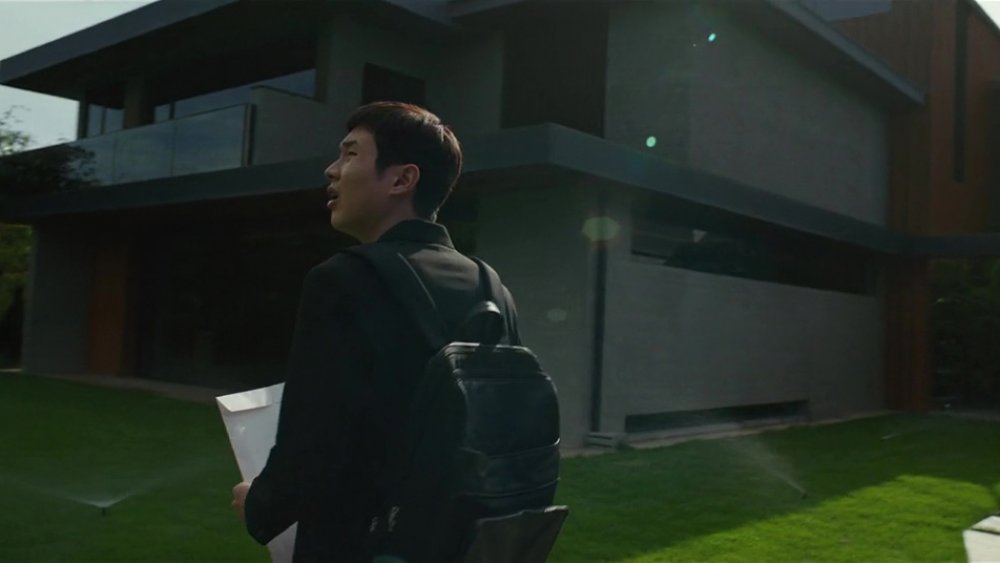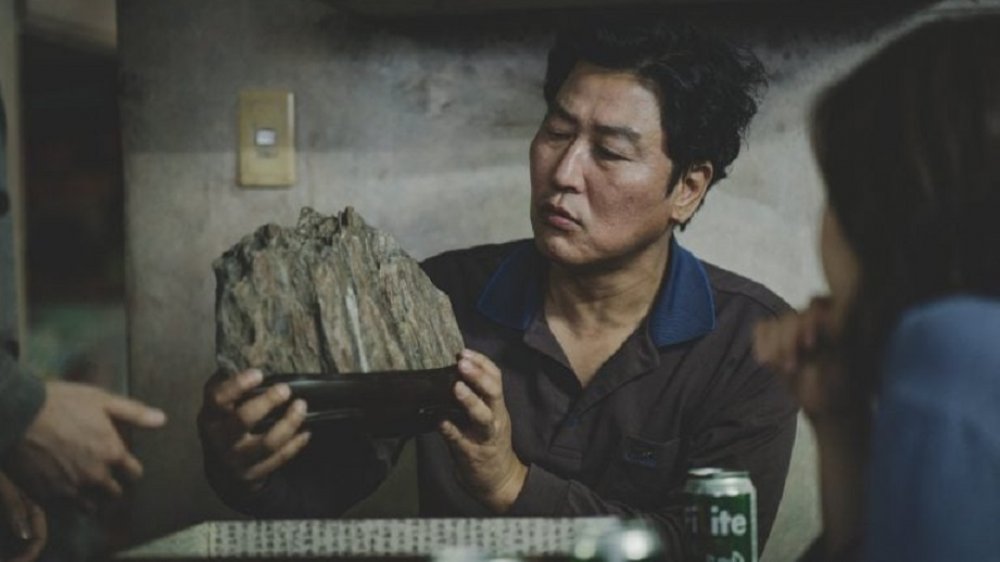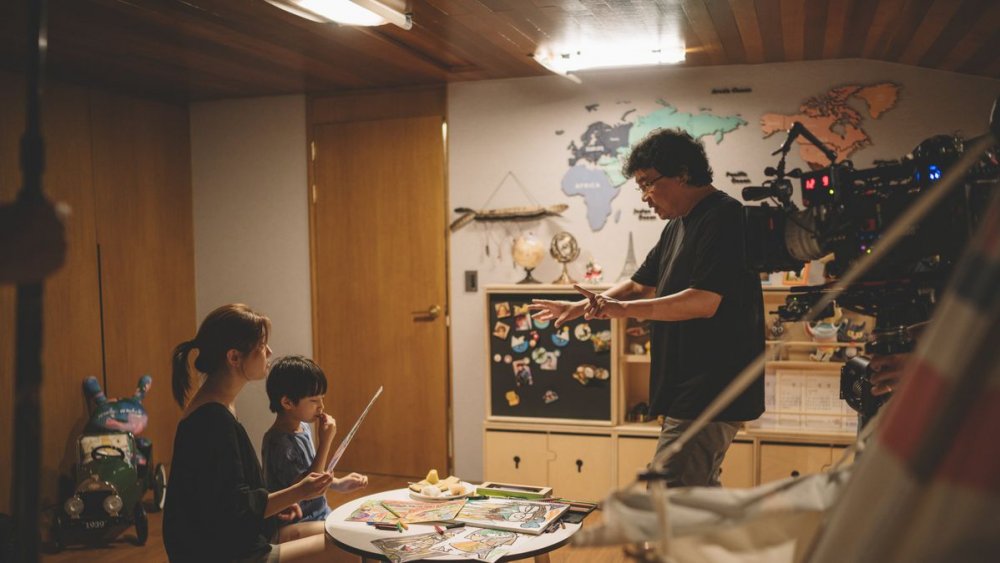The Ending Of Parasite Explained
In 2019, writer/director Bong Joon Ho unleashed Parasite, a darkly comic thriller about a poor Korean family's infiltration of the lives of their rich employers, onto the cinematic world. It quickly became one of the most acclaimed films of the year, earning the Palme d'Or at the Cannes Film Festival, landing on numerous best of the year lists, and even launching a Parasite HBO limited series. Fans can be found on the street and in the poshest places in Hollywood: Legendary director Martin Scorsese sent Bong a personal letter of praise. Then came the Oscars, where it secured its place as one of the most celebrated films of the 21st century. Parasite became the first Korean film to win Best International Feature and the first non-English film to win Best Picture.
Indeed, Parasite cast a very long pop culture shadow in 2019, one that will continue to grow as more and more viewers watch it, eager to see what all the fuss is about. That means fans of the film will keep talking about its many twists, including its unforgettable ending, for years to come. We're here to help you on that analytical journey: This is the ending of Parasite, explained.
A new basement-dweller
Parasite's use of visual metaphor in exploring class disparity is masterful. When we meet the Kim family, they are living in a semi-basement apartment in a poor part of town, placing them literally lower than the wealthy Park family they will come to exploit. Then, we meet Oh Geun-sae, a man going mad while living exactly beneath the Park family in their mansion's secret bunker. By the end of the film, after wondering how Geun-sae could survive in that bunker for so long, Kim Ki-taek has moved in himself to escape the consequences of murdering Park Dong-ik.
At the end of the film, Ki-taek describes, in a letter to his son, how he's surviving in the bunker beneath the house, now home to a new family after the Parks moved away. He buried Guk Moon-gwang, the dead former housekeeper, in the backyard, and has managed to steal food whenever he needs to by creeping around the house. Ki-taek's letter makes it seem like he's adjusting well to his new captive life, but the film shows cracks beginning to emerge. Much like his predecessor, Ki-taek is staring at a picture of Park Dong-ik in the basement, weeping and apologizing. This is a man who committed a sudden and brutal murder and then ran into exile in a matter of minutes. There's no way he's entirely sane anymore.
An ambitious son
Early in Parasite, Kim Ki-woo tells his father that he doesn't consider the fake documents he's about to use to infiltrate the Park family a forgery. Yes, he's using fake university papers to get a tutoring job, but it's not a simple con. To him, the documents are just a little early, as he promises his father that he plans to actually enroll in a university and turn his life around in a legitimate way.
By the end of the film, Ki-woo's plans have fallen apart. The scheme to overwhelm the Parks has left his own family reduced by half and put him in the hospital with severe head trauma. Because of this, plus criminal convictions for the fraud he perpetrated on the Parks, Ki-woo is back in the same basement apartment with his mother, still working for a crummy pizza place, and just trying to get by. That doesn't mean his dreams are dead, though. He's got big plans, which are only bolstered by his discovery that his father is actually alive and living in the bunker underneath the mansion previously occupied by the Parks. In the film's final moments, he vows to earn enough money to one day buy the house and free his father, but can he ever really do that? He already tried to rise up, only to be beaten back down again — can he ever rise higher? This is the big question the movie lingers on as it ends.
A grieving mother
Of all the members of the Kim family, audiences learn the least about Chung-sook. Wife to Ki-taek and mother to Ki-woo and Ki-jung, she is the last one to join the Park family scheme by taking over as the family's new housekeeper. Though Chung-sook was always in on her family's plan, the latecoming nature of her part in it reduced her focus within the film. If you look closely, though, you see that she came from a promising beginning, and that it has been eating away at her ever since.
A small memento hanging in the Kim family's apartment reveals that Chung-sook is a former Olympic champion, someone who was probably told over and over again that she had a bright future. By the end of the film, she's a convicted criminal who lost both her daughter and her husband within a single day, tasked with caring for a severely injured son. The finale sees her cleaning her old apartment with a look of longing on her face, missing the daughter who died in her arms. Her tragedy is perhaps the most complete of any character in the film, and while her son is still working to give her a better life, it is all too possible that Chung-sook has given up.
A fearful family
To the Kim family, Choi Yeon-gyo represents their gateway to a better life. Described as "simple" by Min-hyuk, her daughter's former tutor, the matriarch of the Park family is a woman who seems to constantly be in over her head, in need of help and guidance to the point that she builds up an enormous amount of trust in hired help. It's through this trust that the Kim family is able to infiltrate her life, setting off a chain of events that leaves her son traumatized and her husband murdered.
It's hard to imagine exactly what life for Yeon-gyo will look like after the film is over. We know that she took her two children and moved away from the house, but we don't know precisely what she did beyond that. It's definitely possible that she managed to find a new husband fairly quickly, but it's also possible that she ended up with a whole new staff of hired help. After all, she has her husband's wealth to fall back on and has proven to be ill-equipped at running a house on her own. Whatever happens to her, it's quite likely that Yeon-gyo has thrown herself into protecting her children even more than she once did. Her life is going to be one of constantly looking over shoulder, waiting for the next twist she never saw coming.
A potential accomplice
While Yeon-gyo was certainly the gateway through which the Kim family was able to launch their scheme, the actual catalyst for it all was Min-hyuk, Ki-woo's friend who arrives at the beginning of the film and offers both the gift of a landscape rock for the family and a job opportunity for Ki-woo.
As an up and coming university student with a lot of promise, Min is well-liked and respected by the Kim family. In many ways, he seems like a better version of Ki-woo, one more committed to work and time management. He only appears in a couple of scenes, but we know that Min-hyuk is both eager to offer Ki-woo the tutoring job and to protect his secret girlfriend, the Park family's teenage daughter Da-hye.
We don't get to see Min's direct response to the events that unfold in the Park house. We don't know if he ever visited Ki-woo in the aftermath of the deaths at the birthday party, or if he decided to seek out Da-hye. Given his direct ties to Ki-woo — who defrauded the Park family and was convicted for it — it's possible he thought it best to stay away or risk being called an accomplice.
An ongoing investigation
Though there's a lot of fraud and deception going on in the film, most of the crimes in Parasite happen in secret until the very end, when everything violently explodes at a Park family birthday party. In a matter of moments,Ki-woo has sustained major head trauma, Ki-jung, Dong-ik, and the mysterious basement dweller Geun-sae are all dead of stab wounds, and Ki-taek has fled.
The whole event leaves police with quite a mess to untangle, and we don't see most of their work. We become aware of the police investigation when Ki-woo does, after he wakes up from his coma, and all we're really told is that Ki-woo and his mother are convicted of fraud and put on probation, complete with detectives who tail them around town in the hopes of finding the missing Ki-taek. This means there are still quite a few holes in the investigation. They have branded Geun-sae as a "homeless man," they don't seem to know anything about the death of Moon-gwang, and as far as they know there's nothing unusual about the Park house. Will some eager young detective eventually find some detail that cracks the case wide open? It's a lingering question that could come back to haunt Ki-woo someday.
The new tenants
In the final minutes of Parasite, we learn that Ki-taek has managed to survive in relative safety in the Park's former home, and that the home was vacant for a while before a new family moved in. All we really know about them, via Ki-taek, is that they're German, they know nothing about the house's past, and they never really seem to be at home due to various work and school obligations. They have a housekeeper who's there all day, every day, but it's easy enough for Ki-taek to sneak out and raid the fridge at night.
We know from Yeon-gyo's story earlier in the film that her son, Da-song, suffered a traumatic experience when he was in first grade, when he claimed to see a "ghost." This ghost turned out to be Geun-sae, who was living in the bunker beneath the house and sneaking up for food sometimes. Given that Ki-taek has already lapsed into certain patterns that Geun-sae also indulged in — including tapping out Morse code with the light switches and staring at pictures of Park Dong-ik — it's possible that he will one day become the German family's "ghost." Intentionally or not, he's already haunting them.
A metaphorical rock
Parasite is a film dense with metaphors, from the way it uses things like stairs and literal levels of living space to denote class to the way a flood is used near the film's climax to demonstrate the disparity between the Kim and Park families.
One of the most potent metaphors ends up being the "scholar's rock" gifted to the Kim family by Min-hyuk in the beginning of the film. According to Min-hyuk, the rock is supposed to bring "material wealth" to the Kim household, and Ki-woo immediately refers to it as "metaphorical," deliberately provoking the audience into examining what it means. By the end of the film, Ki-woo has left the rock in a stream to be lost after it was used to bash his head in. It did, in the end, bring money to the family, but only for a time.
So, what does it mean? According to Ki-taek's actor Song Kang-ho, the rock initially represents Ki-woo's commitment to "the idea that he can become the kind of guy who can find a way to give his family a better life." That hopeful meaning crashes to the ground, however: "All [the rock] ends up doing for Ki-woo is bashing his skull in." Dreams of change, it turns out, are fragile, and easily crushed by the cold, hard weight of reality.
The director's interpretation
Parasite was one of the most acclaimed movies of 2019, sparking countless analyses and interpretations as fans and scholars alike tried to parse the message and meaning of the film. Much of this analysis has centered on the very end of the film, during which Ki-woo vows to earn enough to buy the Park house, then seemingly achieves that goal. Yet as the film ends, director Bong Joon Ho shows us that Ki-woo's purchase of the house is nothing more than a fantasy. Is it a fantasy he can one day achieve? Not according to Bong.
"Maybe if the movie ended where they hug and fades out, the audience can imagine, 'Oh, it's impossible to buy that house', but the camera goes down to that half-basement. It's quite cruel and sad, but I thought it was being real and honest with the audience," Bong explained.
"You know and I know – we all know that this kid isn't going to be able to buy that house. I just felt that frankness was right for the film, even though it's sad."
So, despite a brief glimmer of hope, Parasite brings down the hammer of grief in its final seconds. Ki-woo can believe all he likes, but his position in society is cemented by the world around him. Like his father, he is imprisoned by circumstance and might never break out.

